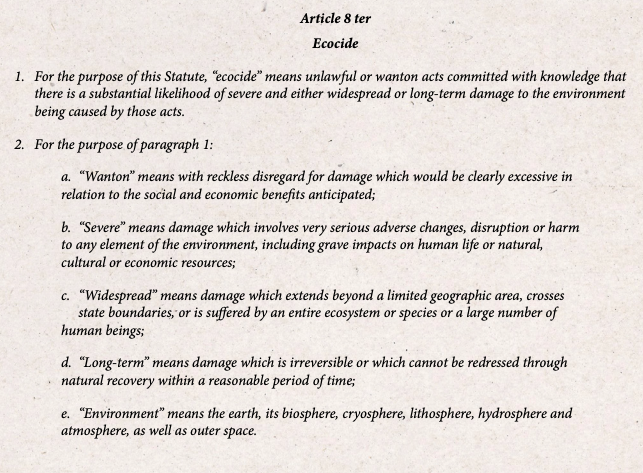
Climate Security
It is now accepted that the effects of climate change are ‘threat multipliers’ to international peace and security. Experts estimate that the risk of armed conflict increases by 10-20% with every half-degree increase in local temperatures.
Climate change is rarely the sole cause of conflict, but is part of a complex and nuanced ‘multiplier’ in precarious situations, further undermining economic, social, environmental and, therefore, political stability. Food insecurity, water scarcity, and resource competition can cause mass migration and prompt clashes over resources or bolster the appeal of non-state armed groups. In turn, conflict and political instability can further contribute to climate change, for example, by illegal logging in rebel held areas.
In 2020, approximately 70% of the ICC Prosecutor’s caseload intersected with issues of climate-security as either a cause, feature, or effect of the mass crimes under investigation.
Why International Criminal Law?
International criminal law is not a panacea for the environmental crisis or global heating. Nor should it be the only focus for environmental or climate justice initiatives. The solution to the crisis requires a broad range of complementary initiatives to effect change through public policy, civil activism, and legal action.
But international criminal law has great potential to influence events of global concern - it can make an important contribution to environmental justice and, indirectly, carbon emissions. Unlike civil courts or human rights bodies, the International Criminal Court (“ICC”) can indict and prosecute actors. And because an ICC investigation can severely undermine the reputation of those accused of complicity, governments, businesses and individuals are likely to change their behaviour to mitigate risk. Even if arrests are never made, the simple fact of an ICC investigation can significantly influence events on the ground, both in the target country and beyond.
Rome Statute Crimes
The Prosecutor of the International Criminal Court has undertaken to prioritise ‘Rome Statute crimes that are committed by means of, or that result in, inter alia, the destruction of the environment, the illegal exploitation of natural resources or the illegal dispossession of land.’ Policy Paper on Case Selection and Prioritization
War Crimes: Situations involving destruction of the natural environment and harm to dependent communities may attract individual criminal responsibility as a war crime under several provisions of the Rome Statute and international humanitarian law (IHL). This is largely because the natural environment is considered a civilian object (or civilian in character) under IHL. Therefore, all the laws that protect civilian objects, also protect nature. In addition to this general protection, there are specific provisions that may apply, such as Article 8.2(b)(iv) of the Rome Statute. See our Guide to Identifying and Framing Environmental War Crimes in Ukraine for a detailed assessment of the applicable law.
Crimes Against Humanity: Rome Statute Article 7 - Crimes Against Humanity – does not require the existence of an armed conflict. However, because the legal definition requires harm to humans, this law can only be applied to situations where (i) environmental destruction inflicts severe and foreseeable harm to communities, or (ii) the connected criminal acts result in both mass human rights abuses and environmental destruction. The fact that the crimes were motivated by financial profit is no defence.
New Ecocide Law
Whilst Rome Statute crimes may be applicable in some situations involving mass environmental destruction, significant gaps exist in the current law, particularly with respect to carbon emissions. Therefore, we work with partners to develop and promote a new international crime of ecocide.
Once the new definition of ecocide has gained traction, it could be put forward by any Rome Statute State Party as an amendment to the ICC Rome Statute. The process requires a specified majority of states to adopt the amendment. A new law could also be adopted by any state at the national level.
‘It is time to understand The Environment for what it is: the national-security issue of the early twenty-first century.’
-Robert Kaplan


